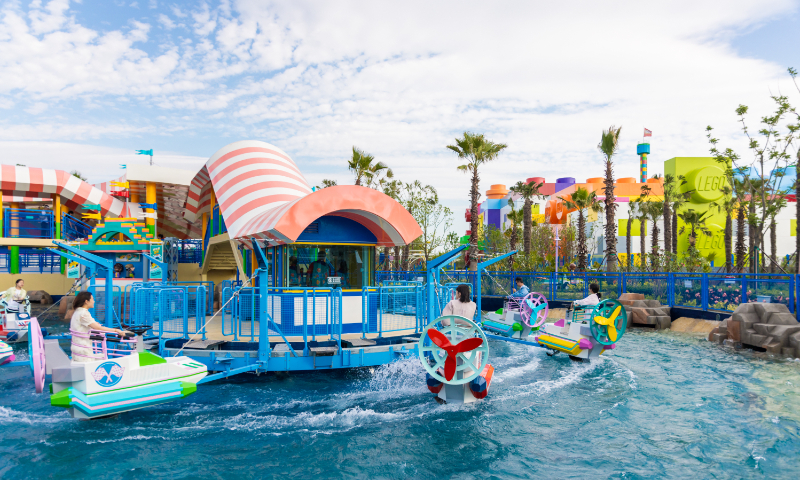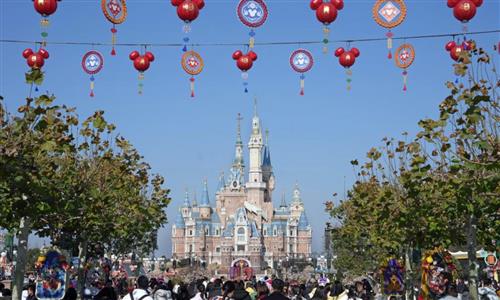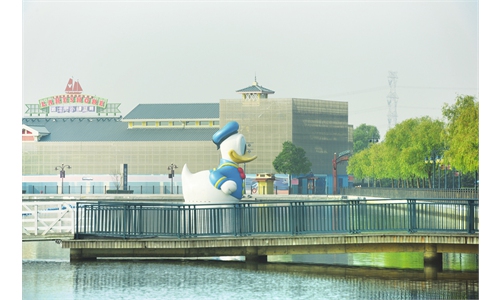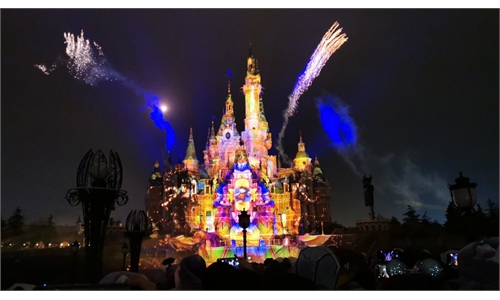
Visitors participate in activities during internal test and trial operation of the Shanghai LEGOLAND Resort on June 6, 2025. Photo: VCG
As China's consumer market continues to expand and diversify, international theme park operators are ramping up their presence in the country, betting on the growing appetite for immersive entertainment and family-friendly leisure experiences.
From Shanghai Disney Resort's ninth anniversary celebration to the upcoming opening of Shanghai LEGOLAND Resort, as well as planned projects like a Harry Potter attraction and a Peppa Pig theme park, global players are competing for a share of China's lucrative "happiness economy" - a sector driven by China's consumption upgrade and supportive policies for foreign investment, analysts said.
Marking its ninth anniversary this June, Shanghai Disney Resort exemplifies the trend through ongoing expansion. The resort on Monday announced major upgrades to its Tomorrowland and Adventure Isle themed areas, introducing new offerings designed to enhance the visitor experience, the Global Times learned.
Expanding presence
"As we commemorate the important milestone of our ninth anniversary while embarking on our next exciting chapter, we look forward to continuing to deliver enchanting experiences that spark joy for guests of all ages at this extraordinary destination through the magic of our storytelling and innovation," Andrew Bolstein, president and general manager of Shanghai Disney Resort, said in a statement sent to the Global Times.
Since its 2016 opening, the resort has consistently expanded to meet China's growing demand for family entertainment. Following the additions of Toy Story Land and Zootopia, construction has begun on a ninth themed area, Spider-Man-themed Land, and a third themed hotel, according to Shanghai Disney Resort.
Meanwhile, the upcoming July launch of Shanghai LEGOLAND Resort represents another major development in China's theme park market. Since May 31, the resort has been undergoing internal testing and trial operations, with facilities including attractions, dining venues, entertainment shows and accommodations undergoing comprehensive evaluation, the Global Times learned from the resort.
"The internal test and trial operation provides a more real-life scenario for us and a review of all our preliminary preparations," Jeanette Chen, general manager of LEGOLAND Shanghai Resort, said in a statement sent to the Global Times.
Currently, construction of commercial streets, seven surrounding roads, two parking areas, one bus terminal, five upscale hotels and inns, and other infrastructure facilities are all underway, according to the Shanghai LEGOLAND Resort.
These developments came alongside other high-profile projects, including the planned 2027 openings of a Harry Potter attraction and a Peppa Pig outdoor theme park in Shanghai, according to companies' statements.
US entertainment giant Warner Bros is set to launch a Making of Harry Potter studio tour in Shanghai in 2027. The project will be the first of its kind in China and the third in the world, the Xinhua News Agency reported in February.
Meanwhile, Asia's first and the world's largest Peppa Pig outdoor theme park will open in Shanghai in 2027. With an investment of over 2.4 billion yuan ($338 million), the park will feature new themed zones, rides, immersive shows, and a hotel tailored to the Chinese market, according to Xinhua
According to China Insights Consultancy, the scale of China's amusement park economy reached nearly 60 billion yuan in 2023 and is expected to exceed 110 billion yuan by 2028, driven by the expansion of leisure activities. Chen Shenyu, a senior consulting advisor with the consultancy, noted that theme parks will play an increasingly vital role in national economic consumption.
Market opening-up
Analysts said the surge in international entertainment investments reflects both the strength of China's consumer market and the country's commitment to opening-up, forming what observers describe as a "happiness economy."
"China's massive consumer base and shifting spending patterns toward experiential consumption create an ideal environment for entertainment operators," Wang Peng, associate research fellow at the Beijing Academy of Social Sciences, told the Global Times on Monday.
In recent years, China's theme park economy has seen rapid growth, emerging as one of the world's fastest-growing markets. As income levels rise and consumption patterns evolve, theme parks have gradually become the preferred choice for family outings and youth leisure, according to iiMedia Research, a market research firm.
Especially, during holidays and peak tourist seasons, the number of visitors to theme parks has continued to rise. A survey from iiMedia in 2024 showed that 79.96 percent of respondents have visited theme parks, while another 12.95 percent planned to do so.
Data from travel platform Fliggy showed that parent-child travel during the Dragon Boat Festival holidays in early June rose by about 20 percent year-on-year. Various theme parks remained the top choice for parent-child families, with ticket bookings for many popular theme parks surging by over 100 percent year-on-year.
Policy support has also played a key role in drawing foreign investment. "Since the beginning of this year, China has continued to expand high-level opening-up and taken solid steps to advance measures for stabilizing foreign investment. China's opening-up provides foreign-funded amusement parks with great development space," Wang said.
The Chinese government has pledged to fast-track landmark investment projects, promote new forms of cultural enterprises, and vigorously expand the tourism sector, according to the 2025 Government Work Report, per Xinhua.
China is accelerating the opening-up of its services sector. The State Council has recently approved a plan that aims to expand comprehensive pilot programs to accelerate the services industry's opening-up, covering 155 pilot tasks across key areas such as market access in major service industries and the promotion of industrial innovation and development.
In the first four months of 2025, 18,832 new foreign-invested enterprises were established on the Chinese mainland, a year-on-year increase of 12.1 percent, according to the Ministry of Commerce.



